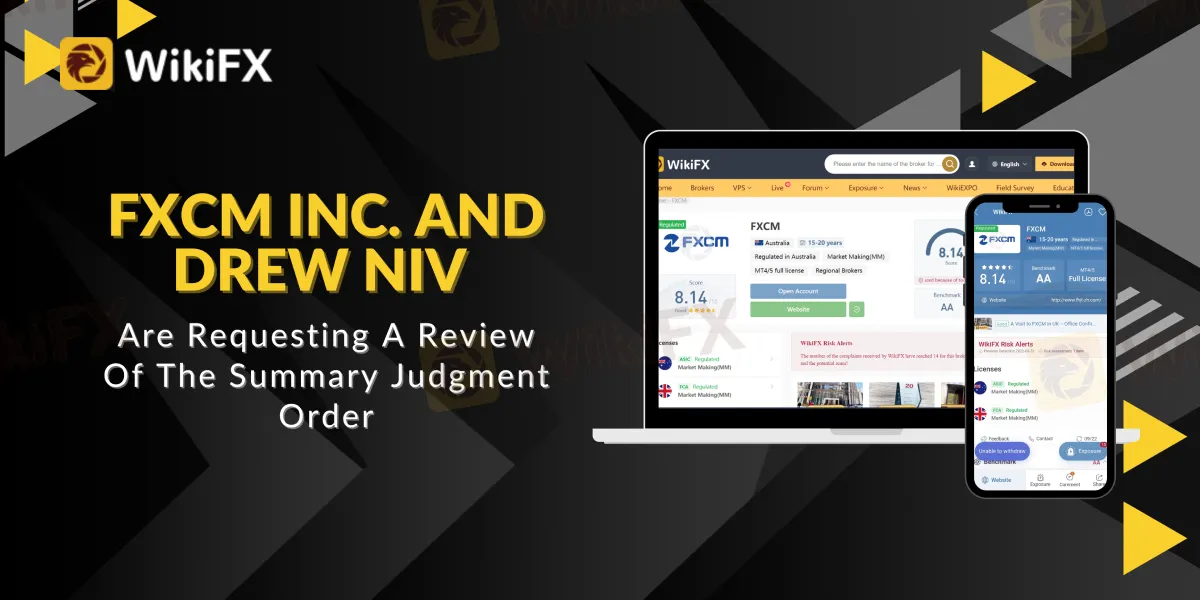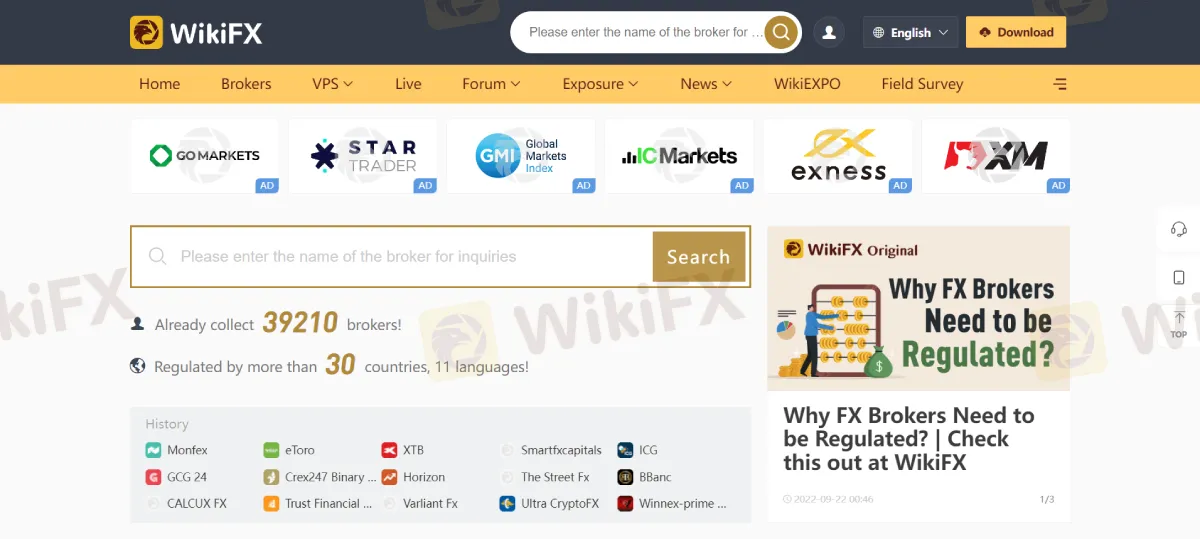FXCM Inc. and Drew Niv Are Requesting A Review Of The Summary Judgment Order
Abstract:According to the plaintiffs, the truth about this financial relationship was revealed three years after it ended on February 6, 2017, when news broke that FXCM had settled with the Commodity Futures Trading Commission (CFTC) and the National Futures Association (NFA) regarding its relationship with Effex.

William Ahdout, Dror Niv, and FXCM Inc, formerly known as Global Brokerage Inc, have requested that the New York Southern District Court certify its decision refusing summary judgment on the question of “loss causation” for interlocutory appeal. The defendants filed the appropriate documentation on September 20, 2022.
Ahdout, Niv, and FXCM Inc are defendants in a securities class action alleging that FXCM made deceptive representations in public filings. The plaintiffs argue that FXCM deceived investors by failing to disclose a financial stake it owned in Effex, a market maker that “earned” the highest proportion of certain types of FXCM trading activity from 2010 to 2014.

According to the plaintiffs, the truth about this financial relationship was revealed three years after it ended on February 6, 2017, when news broke that FXCM had settled with the Commodity Futures Trading Commission (CFTC) and the National Futures Association (NFA) regarding its relationship with Effex.
FXCM Inc adds that the announcement came on the same day that FXCM disclosed harsh regulatory penalties, including a $7 million civil monetary penalty, and that it will cease offering Forex trading services in the United States. On the same day, FXCM revealed intentions to lay off 18% of its personnel.
Despite the fact that FXCM's financial connection with Effex ceased in 2014, the Plaintiffs argue that they were harmed by an inflated stock price before the announcement of such a relationship on February 7, 2017.
Plaintiffs' expert, Adam Werner, believes that “the alleged misrepresentations and omissions artificially inflated the values of the FXCM stock and FXCM Notes throughout the Class Period.” He estimates a price decrease of $3.39 per share for FXCM common stock and $16.31 per $100 of par for FXCM Notes on February 7, 2017, and then applies those cash amounts throughout the class period.
According to the defendants, Werner's analysis fails to distinguish between price declines caused by the disclosure of FXCM's former financial relationship with Effex (which may be recoverable under securities laws) and price declines caused by news of the severe regulatory penalties and the layoff of 18 percent of FXCM's workforce. Werner instead thinks that the regulatory and other repercussions of FXCM's financial connection with Effex were the “inextricable ramifications” of the remedial disclosure.

FXCM disputed the Plaintiffs' inability to separate the regulatory fines from the other facts published on February 7, 2017, at summary judgment. According to FXCM's briefing, a jury cannot tell from Werner's cumulative number how much of the damages “were caused by fraud”—for example, the failure to disclose a prior financial interest in Effex—and how much was caused by the other news announced on February 7, 2017—the payment of a $7 million civil monetary penalty, the closure of FXCM's US trading operations, and the layoff of 18 percent of its workforce.
On August 17, 2022, the Court weighed these issues but declined summary judgment. The Court agreed that the burden of proving loss causation is on the plaintiffs and that they must “prove that their loss was caused by the fraud and not by any intervening events.”
Furthermore, the Court recognized that “to the degree that Plaintiffs establish a materialization of risk' argument and define the risk as the danger of regulatory fines, this approach fails.” The Court emphasized that “the risk must be disguised by the misrepresentations and omissions charged,” and therefore regulatory fines were not, as a matter of law, a concealed risk under that view.
Nonetheless, the Court failed to apply this logic to the Plaintiffs' “corrective disclosure” approach, which was interpreted by this Court to “argue that loss causation might be demonstrated by the market response to the February 2017 statements exposing the alleged fraud.”
Plaintiffs “have the burden to disaggregate damages generated by revelations of the truth underlying the alleged misstatements from losses caused by non-fraud-related reasons,” the Court noted. However, it concluded that rather than deciding the subject as a matter of law, it would “leave a jury to decide whether or not [the regulatory fines] are confusing events that required to be disaggregated.”
According to the defendants, whether a plaintiff may collect damages resulting from regulatory fines imposed on the defendant as a consequence of the alleged securities fraud is a critical legal topic with major significance for this case and other securities lawsuits. And, notwithstanding the Court's decision, judges may disagree—indeed, may have disagreed—with the Court's response.
About FXCM
FXCM continues to be one of the most competitive options for traders, particularly those seeking algorithmic trading solutions. FXCM also provides MT4, NinjaTrader, and ZuluTrade in addition to its proprietary trading platform. Capitalise AI, its most recent innovation, enables traders to automate tactics in an easy-to-use, code-free environment. In addition, FXCM offers six specialty platforms for algorithmic traders and fully supports API trading. FXCM Plus offers excellent research to customers, while new traders benefit from great training resources. I investigated FXCM to see whether it lives up to its goal statement of putting clients first and traders first. Is FXCM committed to providing traders with favorable trading conditions?

Pros
Excellent choice of trading platforms with dedicated support for algorithmic trading
Deep liquidity, transparent order executions, and monthly slippage statistics
Low-cost commission-based cost structure with a volume-based rebate program
Quality research and education via FXCM Plus
Cons
Somewhat limited asset selection
About WikiFX
WikiFX is a platform for searching worldwide corporate financial information. Its primary duty is to provide the included foreign exchange trading organizations with basic information searching, regulatory license seeking, credit assessment, platform identification, and other services.

Over 39,000 brokers, both licensed and unregistered, are listed on the network. WikiFX's staff has been hard at work with 30 financial authorities from across the world to verify that the information supplied is factual and correct.
Stay tuned for more broker news.
Download the WikiFX App from the App Store or Google Play Store.

Read more

Top Profitable Forex Trading Strategies for New Traders
Know profitable Forex strategies for beginners, including risk management tips, best currency pairs, technical analysis tools, and timeframe selection.

WikiFX Review: Is IVY Markets Reliable?
IVY Markets, established in 2018, positions itself as a global brokerage offering a diverse range of trading instruments, including Forex, Commodities, Cryptocurrencies, and Stocks. The platform provides two primary account types—Standard and PRO—with a minimum deposit requirement of $50 and leverage up to 1:400.

Germany's Election: Immigration, Economy & Political Tensions Take Centre Stage
Germany is set to hold a crucial general election on 23 February 2025, with voter frustration over migration emerging as a dominant issue.

ED Exposed US Warned Crypto Scam ”Bit Connect”
The Indian Enforcement Directorate (ED) recently exposed a crypto Scam from a firm called Bitconnect. During the investigation, which took place on February 11th and 15th, 2025. The authority recovered bitcoin worth approximately Rs 1,646 crore & Rs 13.50 Lakh in cash, a Lexus car, and digital devices. This investigation was conducted under the provisions of the Prevention of Money Laundering Act (PMLA) of 2002.
WikiFX Broker
Latest News
eToro Adds ADX Stocks to Platform for Global Investors
Why Do You Keep Blowing Accounts or Making Losses?
B2BROKER Launches PrimeXM XCore Support for Brokers
Germany's Election: Immigration, Economy & Political Tensions Take Centre Stage
WikiFX Review: Is IVY Markets Reliable?
Checkout FCA Warning List of 21 FEB 2025
Google Bitcoin Integration: A Game-Changer or Risky Move?
It is Not True Love | Tips on Avoiding Romance Scams
XTB Secures Chilean License, Expands Latin America Footprint
Fortuno Markets Review: A Risky Choice for Traders?
Rate Calc

